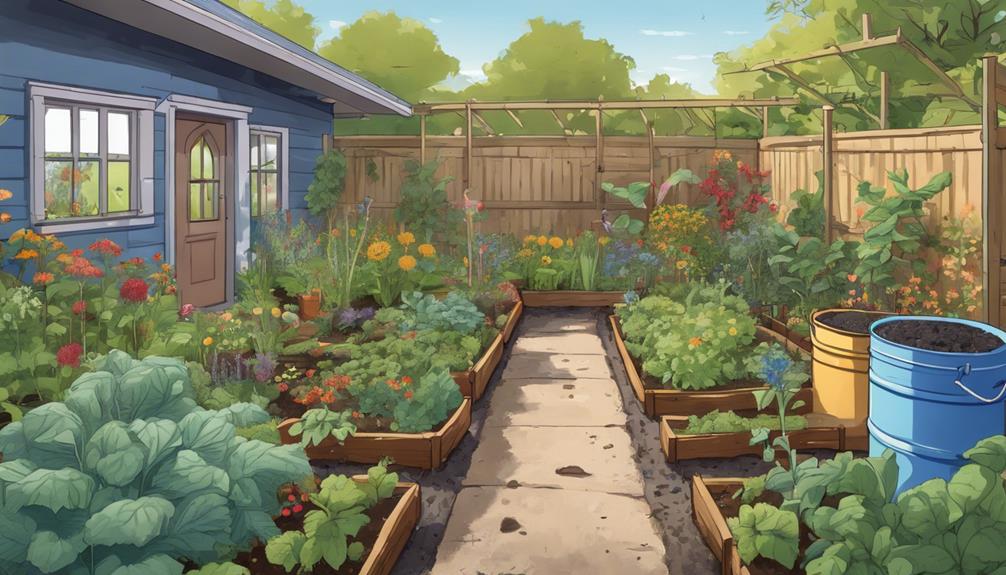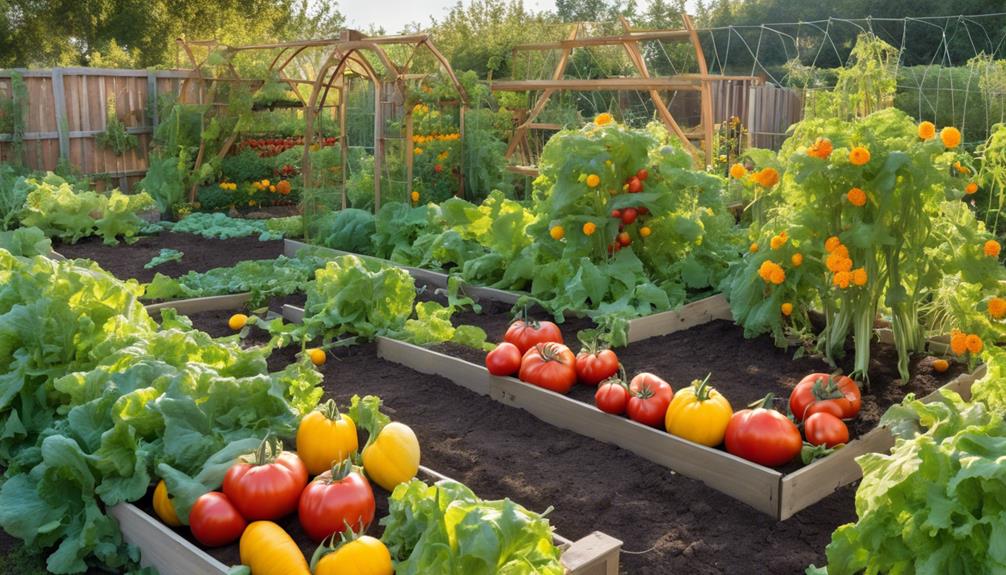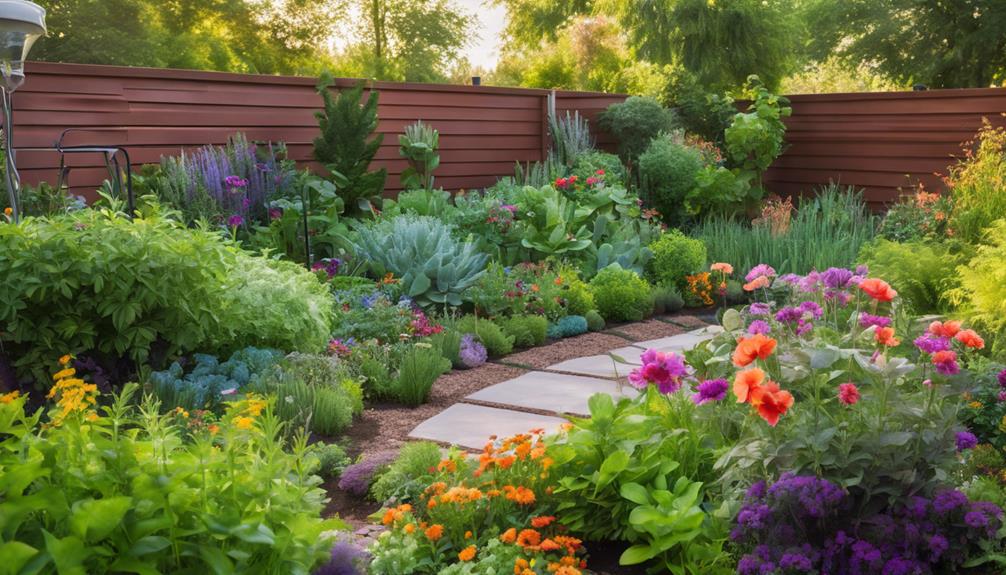
Sustainable Garden Care Techniques You Should Try
29 September 2024
Affordable Garden Care Tips for Busy Families
30 September 2024Sustainable practices in garden maintenance lead to healthier plants and ecosystems.
Prioritise soil health by incorporating organic amendments and conducting regular soil testing.
Select native and drought-resistant plants to reduce resource consumption.
Implement mulching strategies for moisture retention and weed suppression.
Utilise crop rotation to improve soil biodiversity and disrupt pest cycles.
Adopt eco-friendly pest control methods, such as promoting natural predators and using organic deterrents.
By focusing on these principles, gardeners can foster a resilient ecosystem.
Investigate further strategies to enhance your garden's sustainability and increase its productivity.
Garden Sustainability Fundamentals
Understanding the fundamentals of garden sustainability is crucial for promoting a thriving ecosystem.
Key elements include maintaining soil health, which fosters plant growth and resilience, and selecting native plants that are well-adapted to local conditions.
These practices not only improve biodiversity but also reduce the need for chemical inputs and excessive water usage.
Soil Health Importance
At the foundation of sustainable gardening lies the critical importance of soil health, which serves as the lifeblood for plants and the ecosystem as a whole.
Healthy soil is a complex living system, teeming with microorganisms that facilitate nutrient cycling, water retention, and organic matter decomposition. Maintaining soil structure improves aeration and root development, while a balanced pH ensures peak nutrient availability.
Practices such as crop rotation, cover cropping, and minimising soil disturbance contribute to soil health, fostering resilience against pests and diseases.
In addition, the incorporation of organic amendments enriches soil biodiversity, ultimately leading to increased productivity and sustainability.
Native Plant Selection
Choosing native plants is essential for sustainable gardening practices, as they are well-adapted to local climates and soil conditions. These plants typically require less water, fertiliser, and pesticides, thereby reducing resource consumption and chemical runoff.
Additionally, native species support local wildlife, including pollinators and beneficial insects, enhancing biodiversity within your garden ecosystem. When selecting native plants, consider their growth habits, seasonal interest, and compatibility with existing flora.
Engage with local horticultural resources to identify species that thrive in your region, ensuring a flourishing garden that aligns with ecological principles. Ultimately, the strategic incorporation of native plants fosters resilience, minimises maintenance efforts, and contributes to a sustainable landscape that honours local environmental heritage.
Soil Health and Composition
Soil health and composition are critical components of sustainable gardening practices that greatly influence plant growth and productivity.
Techniques such as compost enrichment, mulching for moisture retention, and implementing crop rotation can enhance soil fertility and structure.
Understanding and applying these methods will lead to a more resilient and thriving garden ecosystem.
Compost Enrichment Techniques
Improving soil health through compost enrichment techniques is a fundamental practice for sustainable garden maintenance. By integrating compost into your gardening routine, you can notably enhance soil structure, fertility, and microbial activity.
Employing effective compost enrichment methods will lead to robust plant growth and resilience against pests and diseases.
Key compost enrichment techniques include:
- Adding worm castings to increase nutrient content and microbial diversity.
- Incorporating green manures to boost nitrogen levels and soil aeration.
- Utilising biochar to improve soil retention and increase nutrient availability.
- Mixing in mineral amendments such as rock phosphate for phosphorus availability.
- Layering compost with mulch to promote a thriving soil ecosystem.
Mastering these techniques will ensure your garden thrives sustainably, fostering long-term soil health.
Mulching for Moisture Retention
Integrating mulching into your garden maintenance routine complements compost enrichment techniques by further supporting soil health and moisture retention.
Mulching not only conserves soil moisture but also creates a favourable microenvironment for beneficial organisms. The selection of appropriate mulch materials can greatly enhance your garden's ecosystem.
- Retains soil moisture, reducing irrigation frequency
- Suppresses weed growth, minimising competition for nutrients
- Regulates soil temperature, fostering ideal plant growth
- Improves soil structure as organic mulches decompose
- Prevents soil erosion during heavy rains
Crop Rotation Benefits
The inherent advantages of crop rotation extend far beyond mere yield improvements, significantly influencing soil health and composition.
By systematically alternating crops, gardeners can uncover a multitude of benefits that contribute to sustainable agricultural practices:
- Improved Nutrient Cycling: Different crops utilise and replenish specific nutrients, promoting a balanced soil profile.
- Pest and Disease Control: Rotating crops disrupts the life cycles of pests and pathogens, thereby reducing infestations.
- Soil Structure Improvement: Varied root systems enhance soil aeration and water infiltration.
- Weed Suppression: Diverse planting patterns can outcompete weeds, minimising their growth.
- Biodiversity Promotion: A varied crop selection fosters a robust ecosystem, improving resilience against environmental stressors.
Implementing crop rotation is crucial for maintaining optimal soil health and fostering sustainable gardening practices.
Practical Gardening Techniques
Effective garden maintenance hinges on the implementation of practical gardening techniques that promote sustainability.
Selecting suitable plant varieties tailored to local conditions, coupled with wise and efficient watering practices, greatly enhances plant health and conserves resources.
Furthermore, adopting integrated pest management strategies can mitigate the impact of pests while reducing reliance on chemical interventions.
Select Suitable Plant Varieties
Choosing suitable plant varieties is crucial for sustainable gardening, as it directly impacts both the health of your garden and the surrounding ecosystem.
Selecting the right plants fosters biodiversity, conserves resources, and promotes resilience against pests and diseases.
Consider the following when choosing plant varieties:
- Native Species: Support local wildlife and reduce maintenance needs.
- Drought-Resistant Varieties: Minimise water usage and improve drought resilience.
- Companion Plants: Foster mutually beneficial relationships that enhance growth and deter pests.
- Seasonal Planting: Optimise garden productivity by selecting varieties suited for specific seasons.
- Disease-Resistant Cultivars: Reduce the need for chemical interventions and maintain plant health.
Watering Wisely and Efficiently
For sustainable garden maintenance, watering wisely and efficiently is essential to conserve resources and promote plant health.
Implementing effective watering techniques not only supports plant vitality but also reduces water waste.
Consider the following strategies:
- Water early or late: Minimise evaporation by watering during cooler parts of the day.
- Use drip irrigation: Deliver water directly to the roots, enhancing absorption and efficiency.
- Mulch your garden: Retain soil moisture and reduce the need for frequent watering.
- Monitor soil moisture: Utilise moisture meters to ensure ideal watering frequency.
- Collect rainwater: Install rain barrels to utilise natural precipitation, decreasing reliance on municipal water sources.
Integrated Pest Management Strategies
In the realm of sustainable gardening, integrated pest management (IPM) strategies provide a holistic approach to controlling pests while minimising environmental impact.
By combining biological, cultural, mechanical, and chemical practices, gardeners can effectively manage pest populations without resorting to harmful pesticides.
Key components of IPM include:
- Monitoring: Regularly inspect plants for signs of pest activity.
- Identification: Accurately identify pests to select the appropriate control methods.
- Prevention: Implement practices such as crop rotation and companion planting to deter pests.
- Control: Utilise biological controls, such as beneficial insects, to manage pest populations.
- Evaluation: Assess the effectiveness of management strategies and adjust as necessary.
Implementing these strategies fosters a balanced ecosystem, enhancing garden resilience and productivity.
Increased Biodiversity in Gardens
Increased biodiversity in gardens plays an important role in creating resilient ecosystems that support a wide array of flora and fauna. By incorporating diverse plant species, gardeners can enhance pollinator habitats, improve soil health, and promote natural pest control. This practice not only fosters a vibrant ecosystem but also contributes to the sustainability of garden environments. Below is a table illustrating key benefits and practices to improve biodiversity in gardens:
| Biodiversity Benefits | Practices to Increase Diversity |
|---|---|
| Improved pollination | Plant native flowering species |
| Enhanced soil structure | Incorporate cover crops |
| Natural pest regulation | Use companion planting techniques |
| Increased habitat for wildlife | Create varied microhabitats |
| Resilience to climate change | Implement crop rotation strategies |
Emphasising biodiversity is vital for the long-term success of garden maintenance.
Eco-friendly Pest Control Methods
Effective eco-friendly pest control methods are crucial for maintaining a sustainable garden.
Techniques such as the application of neem oil, the strategic release of beneficial insects, and the implementation of companion planting can significantly reduce pest populations while promoting ecological balance.
Neem Oil for Pest Control
Many gardeners are turning to neem oil as a sustainable solution for pest control, recognising its effectiveness against a wide range of common garden pests.
Derived from the seeds of the neem tree, this natural pesticide disrupts the life cycle of insects without harming beneficial species.
Key benefits of neem oil include:
- Broad-spectrum efficacy: Targets aphids, spider mites, and whiteflies.
- Systemic absorption: Plants absorb neem oil, providing long-lasting protection.
- Reduced toxicity: Safe for humans, pets, and beneficial insects when used correctly.
- Growth regulation: Prevents larvae from maturing into harmful adults.
- Fungal protection: Acts as a fungicide against powdery mildew and other diseases.
Incorporating neem oil into your garden maintenance routine is a strategic choice for sustainable pest management.
Beneficial Insect Release
Introducing beneficial insects into the garden ecosystem is a powerful strategy for sustainable pest control.
These natural allies not only reduce pest populations but also promote biodiversity and improve soil health.
Implementing beneficial insect release can yield significant advantages for the dedicated gardener:
- Predators: Ladybirds and lacewings feast on aphids and other harmful pests.
- Pollinators: Bees and butterflies enhance flower fertilisation, increasing yield.
- Parasitoids: Wasps that lay eggs in pest larvae help regulate populations.
- Decomposers: Earthworms break down organic matter, enriching soil fertility.
- Biodiversity: A diverse insect population fosters ecosystem resilience.
Companion Planting Techniques
Utilising companion planting techniques offers a strategic approach to eco-friendly pest control, fostering a harmonious garden environment.
This practice leverages the natural relationships between plants to deter pests and promote healthy growth. By understanding these interactions, gardeners can enhance their cultivation efforts while minimising chemical use.
- Marigolds: Repel nematodes and aphids.
- Basil: Deters flies and mosquitoes, improving tomato growth.
- Nasturtiums: Attract aphids away from more vulnerable crops.
- Garlic: Naturally repels a variety of pests, including spider mites.
- Beans: Fix nitrogen in the soil, benefiting nearby plants.
Implementing companion planting not only protects crops but also fosters biodiversity, creating a resilient ecosystem within your garden.
Master these techniques for the best results.
Pest Resistance Management Strategies
Effective pest resistance management strategies are crucial for maintaining a sustainable garden ecosystem.
By carefully selecting crop varieties that exhibit natural resistance to pests, introducing beneficial predators, and utilising natural deterrents, gardeners can significantly reduce pest populations.
These integrated approaches not only improve plant health but also promote biodiversity within the garden environment.
Crop Selection for Pest Resistance
Choosing the right crops can significantly enhance a garden's resilience against pests, ultimately reducing reliance on chemical treatments.
Selecting pest-resistant varieties increases biodiversity and strengthens ecosystem balance.
Consider the following strategies for effective crop selection:
- Opt for heirloom varieties known for their natural resistance.
- Utilise companion planting to create a symbiotic environment.
- Incorporate native plants that are adapted to local pests and conditions.
- Rotate crops annually to disrupt pest life cycles.
- Select varieties with natural defences, such as thicker skins or stronger aromas.
Natural Predator Introduction
Introducing natural predators into the garden ecosystem serves as a powerful strategy for managing pest populations without relying on synthetic chemicals.
This ecological approach not only promotes biodiversity but also enhances the resilience of your garden.
To effectively implement this strategy, consider the following key points:
- Identify target pests that threaten your crops.
- Research compatible natural predators such as ladybirds, lacewings, and predatory mites.
- Create a conducive environment by incorporating native plants that attract these beneficial insects.
- Monitor predator and pest populations regularly to assess the effectiveness of your strategy.
- Avoid broad-spectrum pesticides that can inadvertently harm beneficial species.
Natural Deterrents for Pests
While managing pest populations is vital for a thriving garden, utilising natural deterrents can greatly reduce the reliance on chemical interventions.
Employing these strategies not only promotes ecological balance but also enhances the resilience of your garden.
Consider these effective natural deterrents:
- Neem oil: Disrupts the life cycle of pests and acts as a repellent.
- Diatomaceous earth: Destroys the exoskeletons of insects, providing a physical barrier.
- Garlic spray: Emits a strong odour that repels many garden pests.
- Companion planting: Utilises specific plant combinations to deter harmful species.
- Aromatic oils: Natural fragrances that can repel insects when applied properly.
Adopting these methods fosters a sustainable approach, ensuring a healthier garden ecosystem.
Why Choose TKL Birmingham Gardener
Choosing TKL Birmingham Gardener means prioritising expertise and sustainability in garden maintenance. Our team is dedicated to employing environmentally friendly practices that enhance the health of your garden while minimising ecological impact.
With extensive knowledge of local flora and sustainable techniques, we provide tailored solutions that address your unique gardening needs.
Our certified horticulturists utilise organic fertilisers, composting, and advanced irrigation systems to promote soil health and water conservation.
By integrating permaculture principles, we foster biodiversity, ensuring a thriving ecosystem within your garden.
Opting for TKL Birmingham Gardener not only reflects a commitment to sustainable practices but also guarantees exceptional craftsmanship and ongoing support for your gardening endeavours.
Elevate your gardening experience with our professional services that embody mastery in sustainable garden care.
Common Gardening Questions Answered
Many gardeners often find themselves grappling with a variety of questions as they seek to cultivate their green spaces effectively. One common inquiry pertains to plant selection; the choice of plants should align with the local climate, soil type, and available sunlight.
In addition, many wonder about ideal watering practices; a deep but infrequent watering approach encourages robust root development. Pest management often raises concerns; integrated pest management strategies, which emphasise natural predators and organic solutions, can be highly effective.
Moreover, understanding the role of seasonal changes is vital, as it impacts planting schedules and maintenance routines. Engaging with these queries not only improves gardening proficiency but also fosters a sustainable approach to garden management, ultimately contributing to a flourishing ecosystem.
Implement Regular Soil Testing
Soil testing serves as the foundation for successful garden maintenance, providing critical insights into soil health and nutrient availability.
By routinely evaluating soil conditions, gardeners can tailor their practices to enhance plant growth effectively.
Implementing regular soil testing offers several advantages:
- Identifies nutrient deficiencies or excesses
- Determines soil pH levels crucial for plant health
- Guides appropriate fertilisation and amendment strategies
- Monitors changes in soil health over time
- Supports sustainable practices by minimising chemical use




